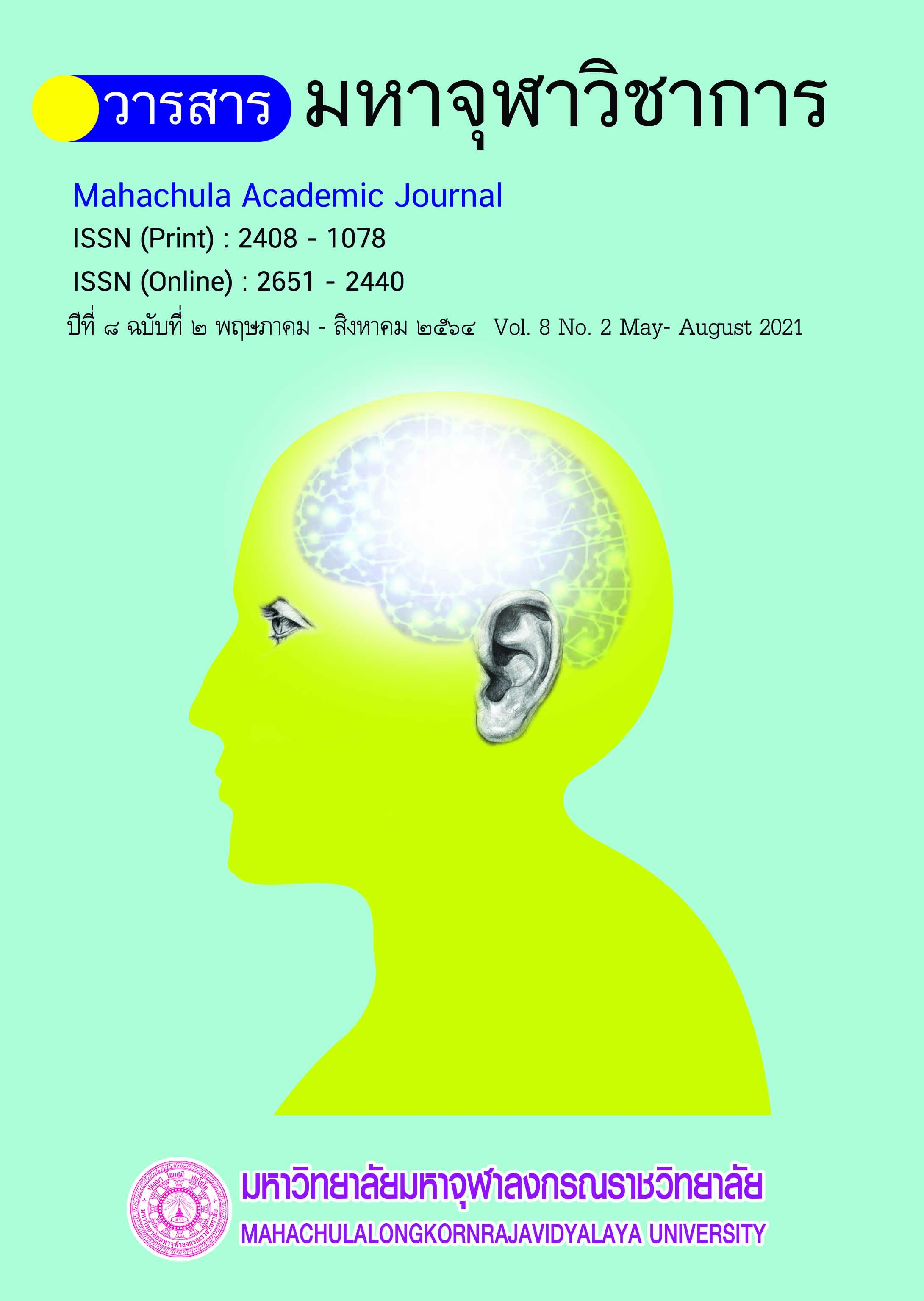An Analytical Study of Dhamma Principles as Depicted in Suvaṇṇasãma Jãtaka
Main Article Content
Abstract
This documentary research entitled “An Analytical Study of Dhamma Principles in Suvaṇṇasãmajãtaka” has three objectives: 1) to study the history of Suvaṇṇasãmajãtaka, 2) to study the Dhamma principles as appeared in Suvaṇṇasãmajãtaka, and 3) to study the application of Dhamma principles in Suvaṇṇasãmajãtaka into Thai society.
The result of the research was found that according to the Buddha history, the Buddha referred Suvan̩n̩asāmajātaka to tell the cause of looking after the parents by telling the Mātuposaka Sutta which concerns the taking care of parents so that the monks did not leave the Buddhist monkhood. Furthermore, the Buddha also praised Suvan̩n̩asāmajātaka as an example that the he had taken care of his parents in the past existence. The Dhamma principles in Suvan̩n̩asāmajātaka are the inevitable law of action (Kamma), the principle of compassion (Mettã) for the harmony of people in the society, the principle of gratitude for helping each other in time of troubles (especially giving gratitude to the elderly), and the principle of ten kinds of kings’ virtues for the peaceful governing of the country.
The applications of Dhamma principles in Suvan̩n̩asāmajātaka were purposely assigned to encourage the children to recognize what were done by their parents so that they will take care of their parents in return and thereby educating the children to be logically humble and obedient with various Dhamma principles. The principle of six directions was applied to create the social relationships, and to educate the children to take their duty so that they will behave towards their parents as the front direction. Moreover, the principle of co-habitation (Sārānīyadhamma) was applied to the principle of co-habitation in order to educate the children to recall their parents' merits, to respect and support the parents. The principle of laymen Dhamma (Gharāvāsa-dhamma) was also applied to educate the children to recognize the importance of the principles of the ethical household life. Lastly, the principle of helping (Saṅngahavatthu) was applied to the people in order to know how to share of materials and to have empathy on good friendship and suitable life in four principles of virtuous existence (four kinds of Brahmavihāra) like a sublime man.
Article Details
References
กรมศิลปากร. โสณนันทชาดก สุวัณณสามชาดก จันทคาธชาดก. พิมพ์เป็นบรรณาการเนื่องในงานพระราชทานเพลิงศพนางโสภิต บรรณลักษณ์ (ลิ้นจี่ กิตติขจร) ณ เมรุหน้าพลับพลาอิสริยาภรณ์ วัดเทพศิรินทราวาส ๑๕ กุมภาพันธ์ ๒๕๑๑. กรุงเทพมหานคร : โรงพิมพ์สำนักทำเนียบนายกรัฐมนตรี, ๒๕๑๑.
พระธรรมปิฎก (ป. อ. ปยุตฺโต). พจนานุกรมพุทธศาสตร์ ฉบับประมวลธรรม. พิมพ์ครั้งที่ ๑๑. กรุงเทพมหานคร : สหธรรมิก, ๒๕๔๕.
พระธรรมปิฎก (ป. อ. ปยุตฺโต). พจนานุกรมพุทธศาสน์ ฉบับประมวลศัพท์. พิมพ์ครั้งที่ ๒๑. กรุงเทพมหานคร : สำนักพิมพ์ผลิธัมม์, ๒๕๕๖.
พระมหาวนัส กตสาโร (ทิมนิ่ม). “การศึกษาวิเคราะห์อธิษฐานบารมีในพระพุทธศาสนาเถรวาท”. วิทยานิพนธ์พุทธศาสตรมหาบัณฑิต. บัณฑิตวิทยาลัย : มหาวิทยาลัยมหาจุฬาลงกรณราชวิทยาลัย, ๒๕๕๓.
พระมหาวิลาศ ญาณวโร. โลกนาถทีปนี. กรุงเทพมหานคร : โรงพิมพ์จำลองศิลป์, ๒๕๐๘.
มหาจุฬาลงกรณราชวิทยาลัย. พระไตรปิฎกภาษาไทย ฉบับมหาจุฬาลงกรณราชวิทยาลัย. กรุงเทพมหานคร : โรงพิมพ์มหาจุฬาลงกรณราชวิทยาลัย, ๒๕๓๙.
ธรรมะไทย. ๓ สุวรรณสามชาดก ( พระสุวรรณสาม ). [ออนไลน์]. แหล่งที่มา : http://www.dhammathai.org/chadok/legend03.php [๒๐ เมษายน ๒๕๖๔].


